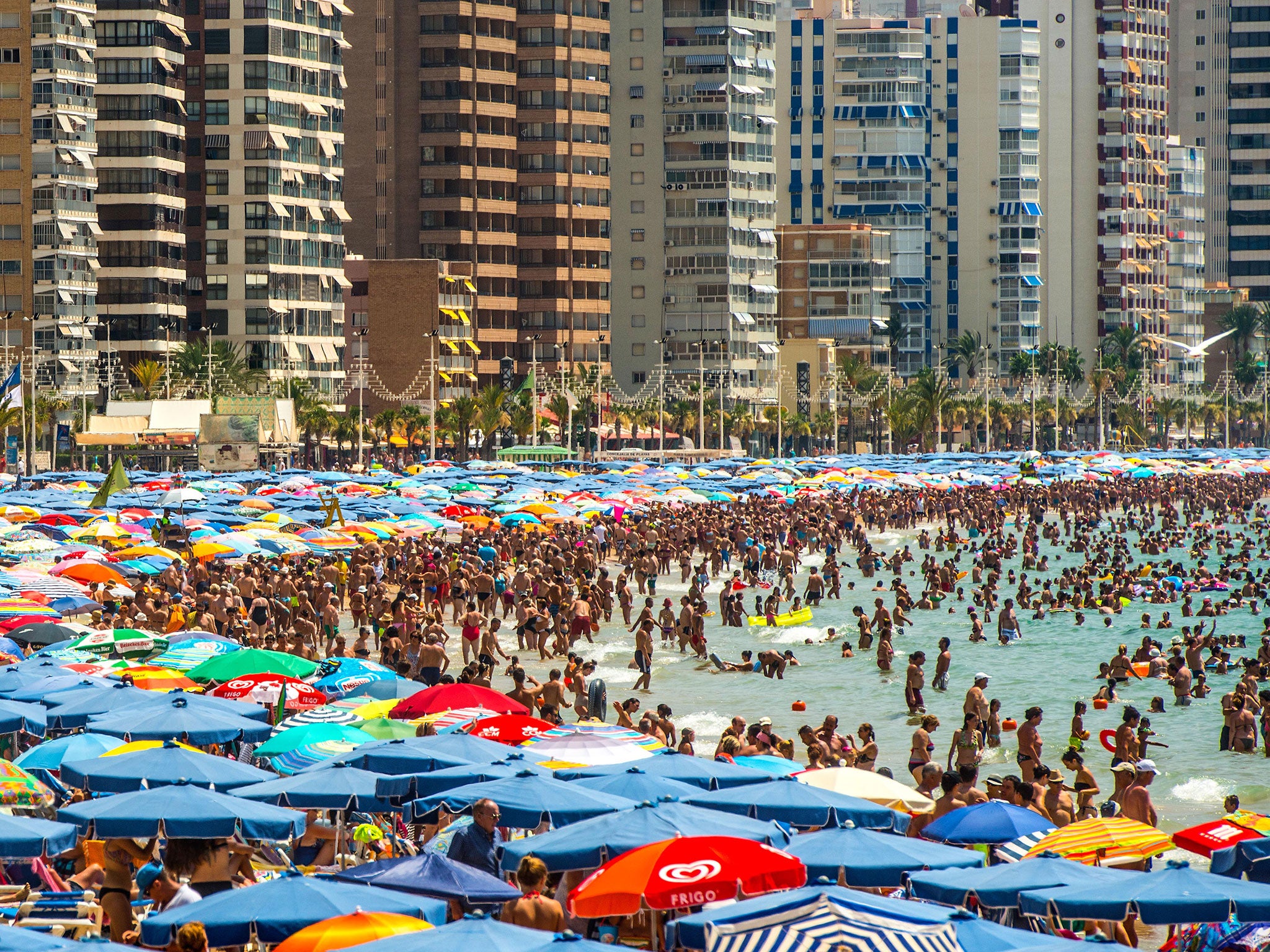Benidorm makes unlikely bid for Unesco World Heritage status
As town officials bid for World Heritage status, Alistair Dawber travels to the Spanish resort to weigh up its chances

The Great Wall of China, the Taj Mahal, the Pyramids of Giza. And now, perhaps, Benidorm. Three are monuments to human achievement, endeavour and industry, and one is Spain’s most famous cheap and cheerful package holiday destination – rarely are they ever mentioned in the same breath.
But that could be about to change if Benidorm is successful in its bid to join the others and become a Unesco World Heritage site.
Despite a sceptical public, town officials are deadly serious about the Unesco process and highlight not only Benidorm’s role as the place where mass tourism took off in Spain in the 1960s, but also its more than 5km of golden beaches, its stunning surrounding countryside and its own unique microclimate.
The town’s new mayor, Toni Perez, is behind the bid, which will take at least another three years. “It’s a story about human creation,” he tells The Independent in his office at Benidorm town hall. “Of course we’re not a monument like the Great Wall of China, but we already meet many of the Unesco criteria. We have sustainability and our model here is what the world is looking for.”
Benidorm is universally known as an inexpensive holiday destination favoured by British stag parties looking for cheap alcohol, sex and lots of sunshine. A walk along Avenida de Mallorca at midnight on Wednesday and it’s easy to see why. Music booms from the brightly lit bars and clubs, a group of young Brits queues up in front of a kebab shop, passing the time staring at a young woman dancing on a tabletop in her underwear. A man appears to have passed out on a nearby bench.
“People come here to get drunk and have a good time,” says Navid Akhtar, a barman at the Broadway pub. As we speak a man with a northern accent comes over to tell Mr Akhtar that the toilet is overflowing. “I have been here for five years and its good business – people spend lots of money and enjoy themselves. But Unesco, I don’t think so. We’re not exactly full of heritage,” Mr Akhtar says.
Avenida de Mallorca is in the middle of the area that is always full of Brits. A walk along the street will bring offers of “free shots”, “gear” and “girls” by several of the people trying to persuade holidaymakers to enter one of the bars.
“You can put a pig in a dress, but it’s still a pig,” says one Brit, drinking in a nearby bar where a darts match is being shown on the TV screens. He declines to be named, but says: “I’ve been working here for six years and it’s all about the Brits. Honestly though, I make my money through selling drugs – coke, weed, pills – it’s what we do. It’s supply and demand.”
Each August, Benidorm’s population swells from the 80,000 on the electoral roll, to more than 300,000. It is Spain’s third most popular tourist destination after Madrid and Barcelona and Brits make up the majority of people who visit. Mr Perez says that he does not want to discourage the British from coming, but says that the Unesco bid is about showing that Benidorm has more to offer. “The bid is not a joke,” he said. “The UK media treats us a little bit like a joke, but we have theme parks for families, we have great beaches, we have stunning countryside nearby. There is something for everyone here, and hopefully the Unesco bid will help to highlight these things.”
Mr Perez’s officials point out that both Iker Casillas, the recently departed Real Madrid captain, and actor Bruce Willis have stayed in up-market parts of the resort in recent weeks, and says that as well as the beer-drinking Brits, part of the Unesco process is about attracting a more affluent tourists.
“We want to speak about the whole of Benidorm, not just the bars and the beaches. We want to welcome lots of different types of people to Benidorm,” Mr Perez adds.
And perhaps he has a point. Until the 1960s, Benidorm was a sleepy fishing village with just 3,000 inhabitants. A local with connections in Madrid persuaded General Francisco Franco to drop his opposition to mass tourism and specifically the bikini, which was frowned upon at the time by the conservative dictatorship. Many of the hotels are owned by locals, and the southern part of the town is almost entirely Spanish. It is easy to laugh at the Unesco bid, and to point out Benidorm’s flaws, but its development is closely linked to that of Spain, and in that respect, it has rich heritage.
On Avenida de Mallorca, however, the holday-makers will take some persuading. Tanya, who lives in Chester but describes herself as a regular visitor to Benidorm, sums up the problem officials have with Benidorm’s reputation. She scoffs at the idea of her favourite resort being recognised by Unesco. “Come on,” she says. “This is Benidorm.”
Subscribe to Independent Premium to bookmark this article
Want to bookmark your favourite articles and stories to read or reference later? Start your Independent Premium subscription today.

Join our commenting forum
Join thought-provoking conversations, follow other Independent readers and see their replies